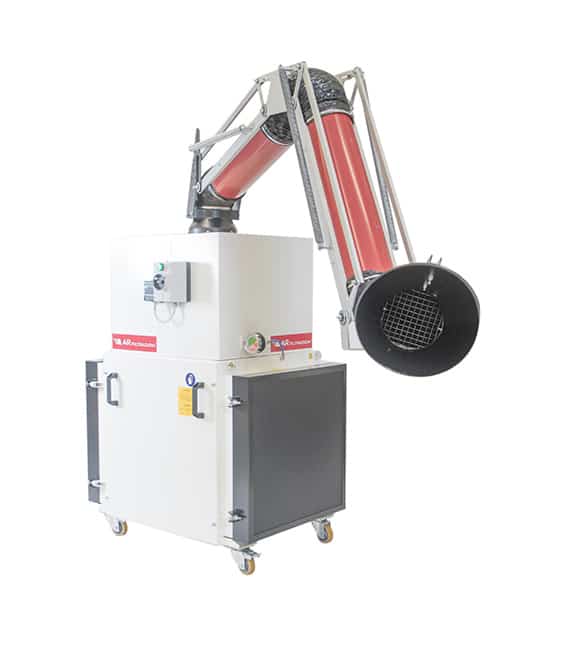WELDING
AR FILTRAZIONI | WELDING
The filtration solution for all pollutants produced during welding
Welding is the procedure that allows the physical/chemical union of two joints by melting them, or by filler metal. In this type of processing the reached temperature melt the materials, transforming them physically and chemically.
AR Filtrazioni has the ideal solution for filtering the pollutants produced during welding process, filtering and purifying the air that would otherwise be inhaled by the operator, thanks to particular suction arms, moving 360° degrees.
The problem of fumes during the welding process
Welding is the procedure that allows the physical/chemical union of two joints by melting them, or by filler metal.
It can be the component material of the joined parts, but it can also affect foreign material, called filler material: in the first case we speak of autogenous welding (with or without filler material as appropriate) in the second of heterogeneous welding or brazing (in which the casting affects only the filler material).
It creates a permanent connection different from other permanent connections (for example riveting or gluing) which do not create the continuity of the material. With some autogenous welding processes, if carried out correctly and according to certain principles, the total continuity in the characteristics of the material of joined parts is guaranteed.
In its broadest sense, welding refers to the union of different materials by heat input, but with similar materials, too; an example, the welding of plastic materials. Even glass can be “welded”, but welding par excellence takes place between metals.
Main proceedings
Heterogeneous welding or brazing
Heterogeneous welding is commonly called brazing and allows to join the parts by melting the filler alloy only and keeping the edges of the joint intact. In the field of brazing, the following stand out:
– strong brazing: temperatures over 450 ° C but below the melting point; the joint must be prepared allowing the penetration of the filler material by capillarity
– soft brazing: it is carried out with temperatures below 450 ° C and below the melting point of the materials; the joint must be prepared allowing the penetration of the filler material by capillarity
– braze-welding: the filler alloys melt at temperatures higher than for strong brazing but always lower than the melting point of the materials; the joint is prepared similarly to preparation for autogenous welding.
All these types of welding produce very toxic pollutants, based on various factors, such as operating temperatures or welded materials.
These factors must necessarily be taken into consideration before choosing the best AR Filtrazioni filtration and purification system.
The problem of oil-dust-fumes mists if not held in mechanical workshops.
The volatility of polluting particles such as industrial fumes, oil mists and aerosols, whether solid or liquid, entails and creates various problems for metalworking companies, operators and machine tools.
First of all, they negatively affect the health of the air and the health and hygiene conditions of the operators, in particular at the respiratory level, since the particles smaller than 0.3 microns can reach the pulmonary alveoli, compromising the respiratory tract. Not only that, in contact with the epidermis, they create skin irritations, dermatitis and redness.
From a purely production point of view, pollution in the workshop resulting from micro dust and oily mists considerably reduces the productivity of the plant and in particular the efficiency of the machine tools, since the stratification of pollutants invalidates the precision and tolerance of the measure, with the onerous consequence of having to increase maintenance on the most delicate components.
Dusts, oily mists and aerosols, if not filtered and purified, make the floor slippery, dirty the surfaces of the machine tools and the walls of the shed, on which they settle.
Without forgetting any possible fines deriving from current regulations, which impose a concentration limit for oily mists in the workplace.
Italian TLV limit 5 mg / m3
more restrictive ACGIH limit 0.5 mg / m3
AR FILTRAZIONI APPLICATIONS | WELDING
Discover our ideal series of industrial air cleaners ideal for all types of processing and pollutants
THE AIR CLEANER FOR YOUR NEEDS
CHOOSE YOUR RIGHT SOLUTION
Select by
MACHINERY
Choose the processing type and consequently the desired machine. You can choose the ideal filtration unit for your machine.
Learn how to reduce oil consumption, save on conditioning and reduce CO2 emissions.
Fill out the form and our calculation system will immediately quantify the savings you can get and send you the results by email.















